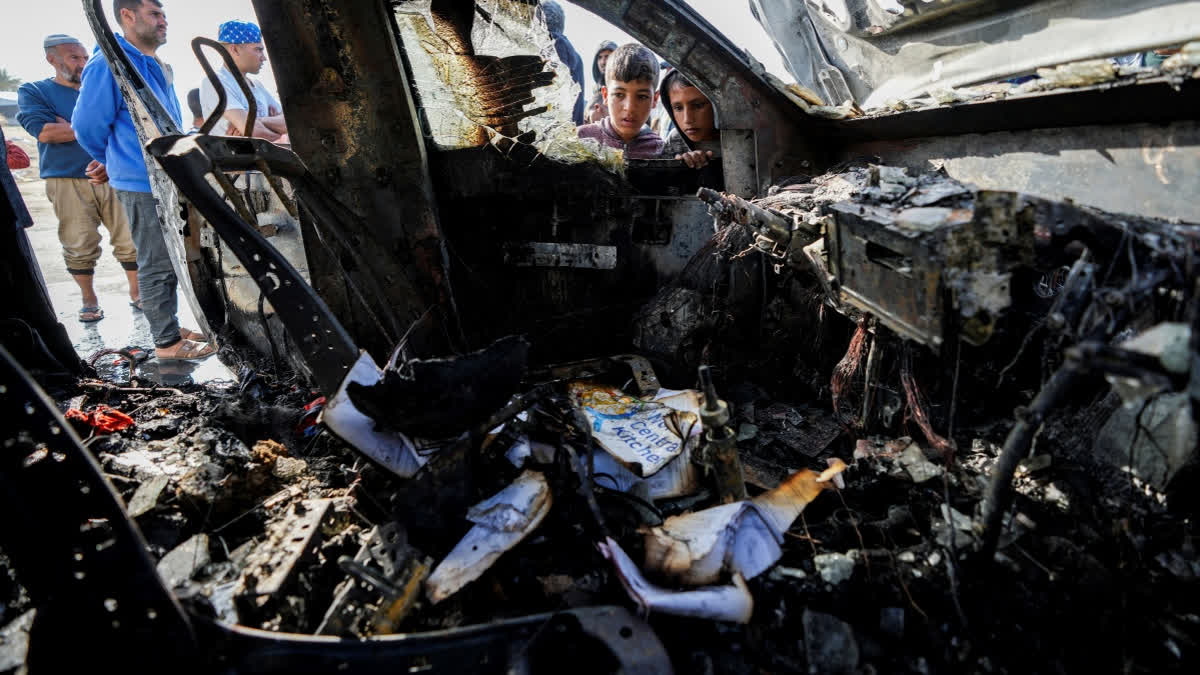Jerusalem: The Israeli military said Friday that it dismissed two officers and reprimanded three others for their roles in drone strikes in Gaza that killed seven aid workers on a food-delivery mission, saying the officers had mishandled critical information and violated the army's rules of engagement.
The findings of a retired general's investigation into the Monday killings marked an embarrassing admission by Israel, which faces growing accusations from key allies, including the United States, of not doing enough to protect Gaza's civilians from its war with the militant Hamas group.
The findings are likely to bolster widespread skepticism over the Israeli military's decision-making. Palestinians, aid groups and human rights organizations have repeatedly accused Israeli forces of firing recklessly at civilians throughout the conflict — a charge Israel denies.
"It's a tragedy," military spokesman Rear Adm. Daniel Hagari told reporters. "It's a serious event that we are responsible for, and it shouldn't have happened. And we will make sure that it won't happen again."
With pressure mounting on Israel, Hagari and other officials shared the results of the investigation with reporters late Thursday.
The speed of the probe and the swift punishment of five senior officers were unusual. Such investigations are often slow and in most cases end without charges being filed. Human rights activists have long complained that Israeli forces operate in a climate of impunity, an allegation the military rejects.
Still, the punishments and the apology seemed unlikely to calm the rising international outcry over the deaths of the World Central Kitchen workers, or to reassure international aid groups that it is safe to resume operations in Gaza, where nearly a third of the population is on the brink of starvation.
The army declined to answer questions about whether similar violations of rules of engagement have taken place during the war. In addition to many civilian deaths, more than 220 humanitarian workers have been killed in the conflict, according to the United Nations, including at least 30 killed in the line of duty.
World Central Kitchen called the investigation and disciplinary actions "important steps forward" — but said more needed to be done.
"Without systemic change, there will be more military failures, more apologies and more grieving families," the statement read, repeating a call for an independent investigation.
U.S. Secretary of State Antony Blinken said it was important that Israel was taking responsibility, and that the U.S. would review the findings "to see not just what steps are being taken but the results."
Military spokespeople said that under the Israeli army's rules of engagement, officers must have more than one reason for identifying someone as a target before they can be hit. But the investigation determined that a colonel had authorized the series of deadly drone strikes on the convoy based on one major's observation — from grainy drone-camera footage — that someone in the convoy was armed.
That observation turned out to be untrue, military officials said.
The army said the colonel and the major were dismissed, while three other officers were reprimanded, the most senior of whom was the head of the Southern Command. The results of the investigation were turned over to the military's advocate general, who will decide whether the officers or anyone else involved in the killings should receive further punishment or be prosecuted.
The killings were condemned by Israel's closest allies. They heightened criticism of Israel's conduct in the nearly 6-month-old war with Hamas — and put renewed focus on the dire situation in Gaza. The humanitarian group Oxfam says people in the enclave's north have been surviving on an average of 245 calories a day since January — less than the amount found in a can of fava beans and less than 12% of the recommended daily intake.
Israel has promised to open more border crossings into Gaza and increase the flow of aid into the territory. But Blinken said Friday that those measures may not be enough to meet the Biden administration's demands for dramatic improvements in humanitarian conditions.
